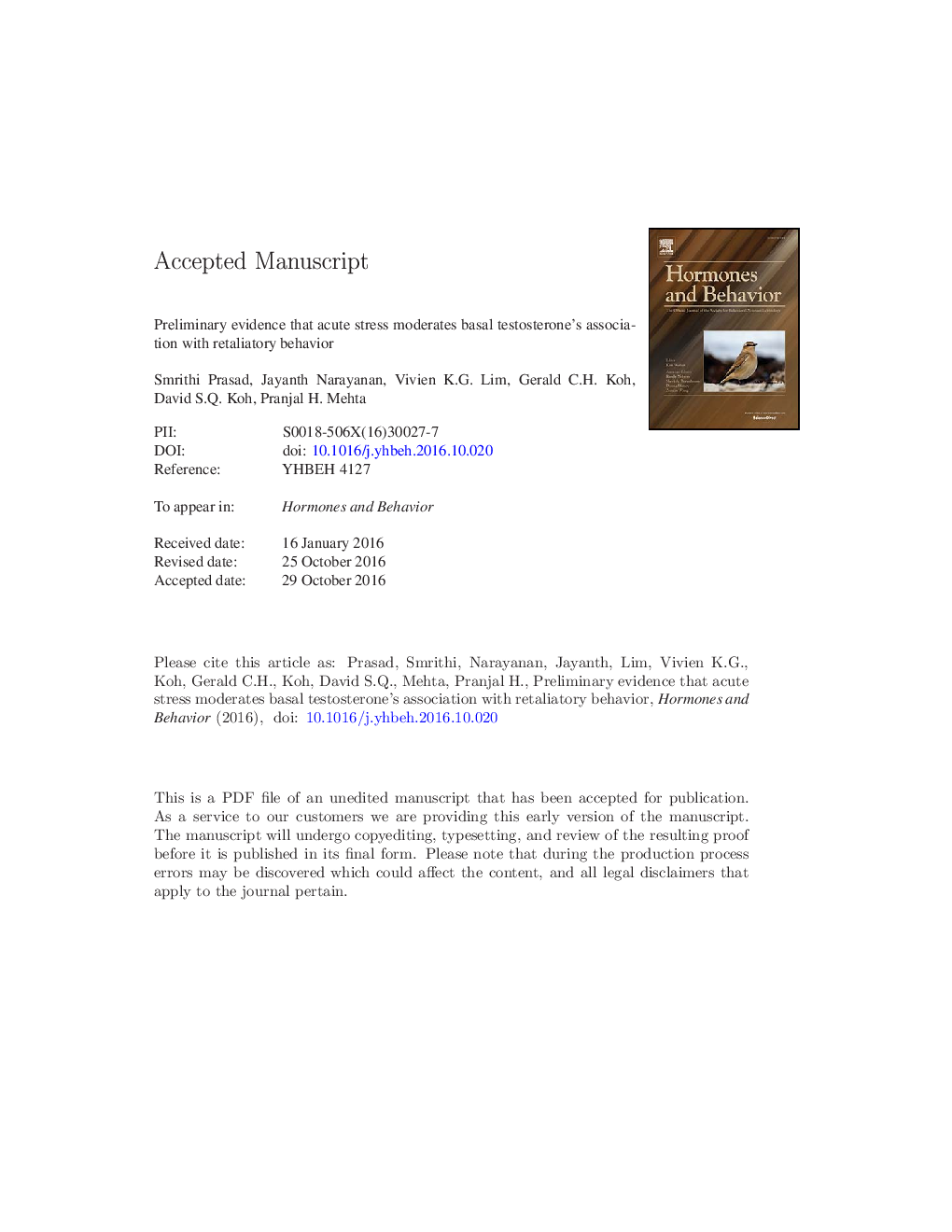| کد مقاله | کد نشریه | سال انتشار | مقاله انگلیسی | نسخه تمام متن |
|---|---|---|---|---|
| 4931156 | 1432748 | 2017 | 64 صفحه PDF | دانلود رایگان |
عنوان انگلیسی مقاله ISI
Preliminary evidence that acute stress moderates basal testosterone's association with retaliatory behavior
ترجمه فارسی عنوان
شواهد اولیه نشان می دهد که استرس حاد، ارتباط تستوسترون پایه با رفتار متقابل را کاهش می دهد
دانلود مقاله + سفارش ترجمه
دانلود مقاله ISI انگلیسی
رایگان برای ایرانیان
کلمات کلیدی
تستوسترون، فشار، کورتیزول، بازی اولتیماتوم، مجازات تفاوت های جنسی،
موضوعات مرتبط
علوم زیستی و بیوفناوری
بیوشیمی، ژنتیک و زیست شناسی مولکولی
علوم غدد
چکیده انگلیسی
Testosterone is theorized to increase retaliation after social provocation. However, empirical evidence in support of these theories is mixed. The present research investigated whether acute stress causally suppresses testosterone's association with retaliation. We also explored sex differences in behavioral responses to acute stress. Thirty-nine participants (51.28% male) were randomly assigned to a high- or low-stress condition. Then participants engaged in 20 one-shot rounds of the ultimatum game, which was used to assess retaliatory behavioral responses to unfair treatment. Participants provided two saliva samples to measure testosterone and cortisol concentrations - one sample before the stress manipulation, and the second after the ultimatum game (20Â minutes post-stressor). Results revealed a positive association between basal testosterone and retaliation in the low-stress condition, but not in the high-stress condition. Further, cortisol concentrations increased in the high- compared to the low-stress condition, and these cortisol changes moderated the association between basal testosterone and retaliation. The associations between basal testosterone and retaliation under varying levels of stress were similar in men and women. However, there was a sex difference in behavioral responses to the stress manipulation that was independent of testosterone. In women, the high-stress condition reduced retaliation compared to the low-stress condition, whereas in men the opposite pattern emerged. Collectively, this study (i) provides preliminary evidence that experimentally manipulated stress blocks basal testosterone's association with retaliation, and (ii) reveals a sex difference in retaliation under varying levels of stress. Discussion focuses on mechanisms, limitations, and the need for follow-up studies with larger sample sizes.
ناشر
Database: Elsevier - ScienceDirect (ساینس دایرکت)
Journal: Hormones and Behavior - Volume 92, June 2017, Pages 128-140
Journal: Hormones and Behavior - Volume 92, June 2017, Pages 128-140
نویسندگان
Smrithi Prasad, Jayanth Narayanan, Vivien K.G. Lim, Gerald C.H. Koh, David S.Q. Koh, Pranjal H. Mehta,
